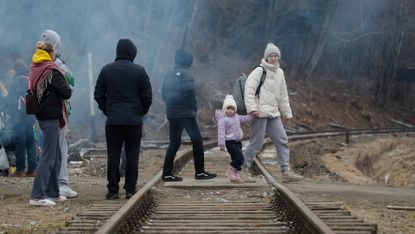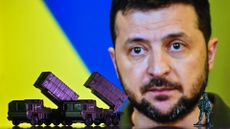How to talk to children about the Ukraine war
Tips on how to approach discussions about the conflict from The Week Junior’s Anna Bassi

We know that many children have questions about what's happening in Ukraine and that they are likely to find the news upsetting. Here are a few tips for handling these sensitive discussions.
Acknowledge how they’re feeling
It's important to acknowledge your child’s feelings and give them the time and space to express them. Feeling angry, sad, and worried is normal, and letting children talk about their response to these events will help them to process their emotions. You can tell them that you feel sad too and so do a lot of other people. If a child finds it difficult to explain how they’re feeling then you could suggest writing or drawing instead. If they feel angry, taking some exercise can help.
Look at a map together
Show them where Russia and Ukraine are. Explain that many countries around the world, including the UK, do not support this action and are taking steps to stop the conflict.
Subscribe to The Week
Escape your echo chamber. Get the facts behind the news, plus analysis from multiple perspectives.

Sign up for The Week's Free Newsletters
From our morning news briefing to a weekly Good News Newsletter, get the best of The Week delivered directly to your inbox.
From our morning news briefing to a weekly Good News Newsletter, get the best of The Week delivered directly to your inbox.
Don’t avoid difficult questions
Children need to know that they are taken seriously so it’s important to address their questions honestly and sensitively. You can say that although it can be difficult to talk about events like this, it is vital that people do and that you will do your best to tell them what they need to know. If there is a question you do not know the answer to, explain that it’s a complex situation and there aren’t always easy answers, but many people are working to find solutions and end the war.
Focus on the helpers
From the countries and charities sending food and supplies to the people taking in refugees, there are lots of examples of people who are helping those affected by the war. Let your child know that they can help too – see our suggestions here.
Anna Bassi is editorial directorof The Week Junior, the award-winning weekly news magazine for eight– to 14-year-olds
Create an account with the same email registered to your subscription to unlock access.
Sign up for Today's Best Articles in your inbox
A free daily email with the biggest news stories of the day – and the best features from TheWeek.com
-
 'Republicans want to silence Israel's opponents'
'Republicans want to silence Israel's opponents'Instant Opinion Opinion, comment and editorials of the day
By Harold Maass, The Week US Published
-
 Poland, Germany nab alleged anti-Ukraine spies
Poland, Germany nab alleged anti-Ukraine spiesSpeed Read A man was arrested over a supposed Russian plot to kill Ukrainian President Zelenskyy
By Peter Weber, The Week US Published
-
 Today's political cartoons - April 19, 2024
Today's political cartoons - April 19, 2024Cartoons Friday's cartoons - priority delivery, USPS on fire, and more
By The Week US Published
-
 How would we know if World War Three had started?
How would we know if World War Three had started?Today's Big Question With conflicts in Ukraine, Middle East, Africa and Asia-Pacific, the 'spark' that could ignite all-out war 'already exists'
By Harriet Marsden, The Week UK Published
-
 Will Iran attack hinder support for Ukraine?
Will Iran attack hinder support for Ukraine?Today's Big Question Pro-Kyiv allies cry 'hypocrisy' and 'double standards' even as the US readies new support package
By Elliott Goat, The Week UK Published
-
 The issue of women and conscription
The issue of women and conscriptionUnder the radar Ukraine military adviser hints at widening draft to women, as other countries weigh defence options amid global insecurity
By Harriet Marsden, The Week UK Published
-
 Why is Ukraine backing far-right militias in Russia?
Why is Ukraine backing far-right militias in Russia?Today's Big Question The role of the fighters is a 'double-edged sword' for Kyiv, say commentators
By The Week UK Published
-
 Ukraine's unconventional approach to reconstruction
Ukraine's unconventional approach to reconstructionUnder the radar Digitally savvy nation uses popular app to file compensation claims, access funds and rebuild destroyed homes
By Harriet Marsden, The Week UK Published
-
 What does victory now look like for Ukraine?
What does victory now look like for Ukraine?Today's Big Question Not losing is as important as winning as the tide turns in Russia's favour again
By Elliott Goat, The Week UK Published
-
 Where has the Wagner Group gone?
Where has the Wagner Group gone?Today's Big Question Kremlin takes control of Russian mercenaries after aborted mutiny and death of leadership
By Elliott Goat, The Week UK Published
-
 Will Ukraine's leadership reset work?
Will Ukraine's leadership reset work?Today's Big Question Zelenskyy hints at ousting of popular military chief, but risks backlash amid dwindling munitions, delayed funding and Russian bombardment
By Harriet Marsden, The Week UK Published